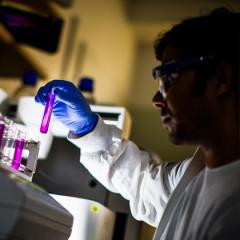It's a tough disease to spot and claims the lives of 1000 women every year, but researchers at the Australian Institute for Bioengineering and Nanotechnology (AIBN) are hoping to turn the tide against ovarian cancer with a device that detects the disease as early as possible.
Over the next five years AIBN nanodiagnostics specialist Dr Mostafa Kamal Masud will use a $750,000 Next Generation Cancer Research Fellowship from Cancer Council Queensland to develop a low-cost, benchtop device that picks up the earliest indicators of ovarian cancer in a patient’s blood, while also precisely monitoring the disease through treatment.
Detecting ovarian cancer early is crucial but extremely difficult given symptoms are often vague and resemble other illnesses, while current screening tests are ineffective. Stay on top of our industry news and developments, events and opportunities, by joining The NetworkJoin The Network
This means of the 1800 or so Australian women who are diagnosed each year, 70 per cent have already reached an advanced stage of cancer.
Dr Masud said he was hoping to improve the odds with sensor technology that steers patients towards preventative care options at the earliest possible opportunity.
“The testing methods for ovarian cancer that do exist are quite expensive and tedious, which makes screening very tricky,” Dr Masud said.
“And of course the longer something like this is left undiagnosed, the more serious the problem becomes.
"That is why many people diagnosed with ovarian cancer have already reached a point where it has spread to other parts of their body.”

Through his five-year fellowship, awarded through the National Health and Medical Research Council’s Investigator scheme, Dr Masud will develop novel mesoporous nanostructures capable of automatically isolating, purifying, and simultaneously detecting cancer biomarkers in a patient’s blood.
Dr Masud said his biosensor technology would be designed as a device that compact, portable, and simple enough to be operated out of a GP’s office.
This will make it suitable for communities who might not have the technicians and equipment that are usually required to amplify cancer biomarkers and interpret the data.
“Whether someone has access to cancer testing should not be determined by their postcode, or whether they have a certain amount of money,” he said.

“Therefore, we are designing a cost-effective device that collects all the information and processes it on the spot, with results available within two hours.”
The ovarian cancer biosensor project is an extension of the wider research Dr Masud has carried out at the AIBN under the guidance of senior group leader Professor Yusuke Yamauchi, the world-renowned nonarchitect and ARC Laureate.
The project is also a deeply personal one for Dr Masud, following the untimely loss of his aunt to ovarian cancer, and the loss of his grandmother to colon cancer due to late-stage detection.
“I have seen how cancer affects people and their families, and I’m also inspired by the strength of people dealing with cancer and their stories of hope,” he said.
“This motivates me to work on finding solutions for this tough disease.”
Cancer Council Queensland chief executive officer Andrew Donne said he was proud to see the Next Generation Cancer Research Fellowships program enable researchers like Dr Masud.
“Replacing the ACCR grants scheme, these fellowships fund early career cancer researchers – like Dr Mostafa Kamal Masud – who are on the frontline of clinical innovations in cancer detection and treatment,” Mr Donne said.

“Thanks to our generous donors, Cancer Council Queensland is proud to be funding local researchers like Dr Masud, who will go on to make global breakthroughs.
“With their innovative approaches and deep personal commitment to improving patient outcomes, these recipients represent the future of cancer research, and we are proud to provide the necessary funds to support their life-saving work.”
Media: AIBN Communications, Alex Druce, a.druce@uq.edu.au, +61 (0)447 305 979


